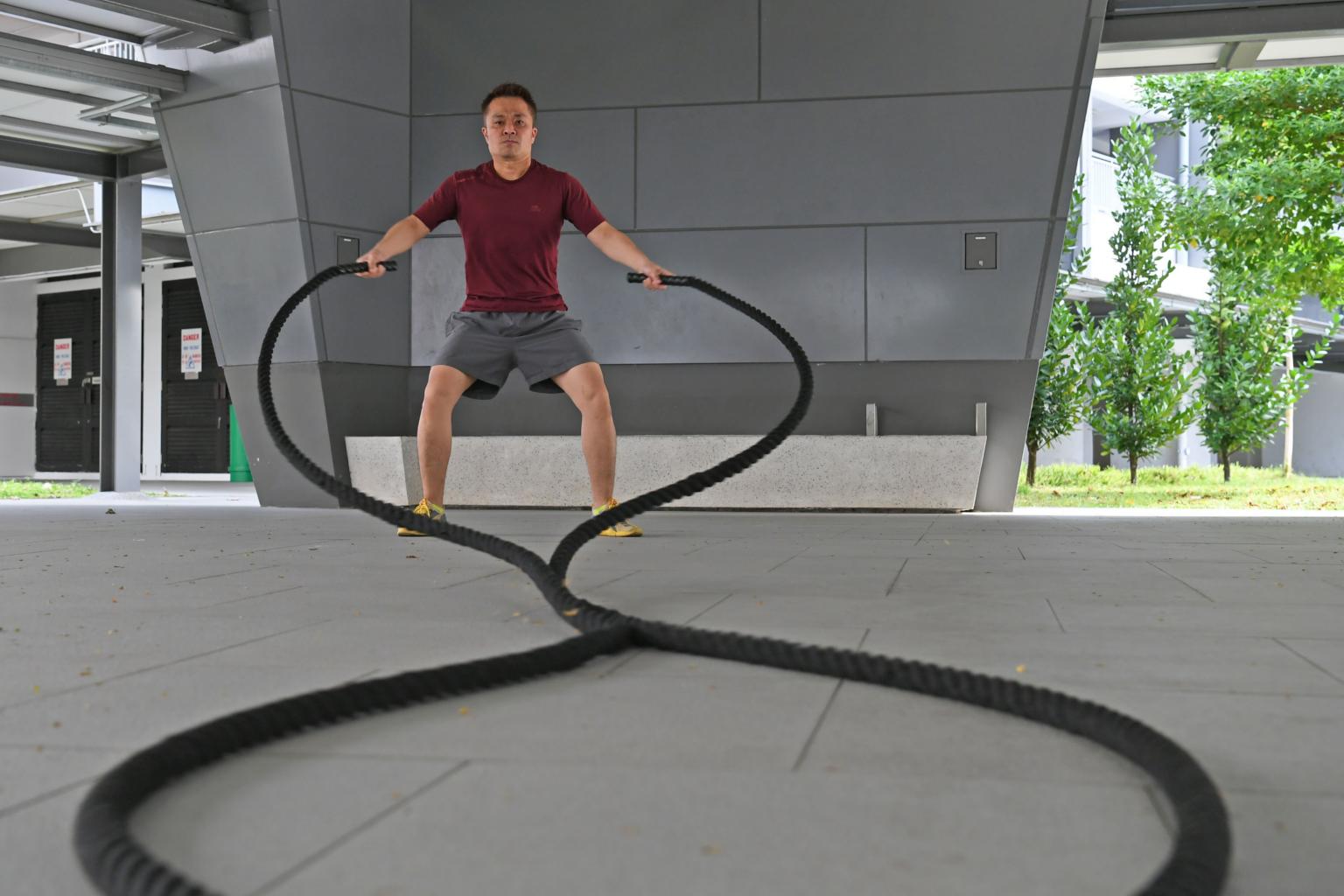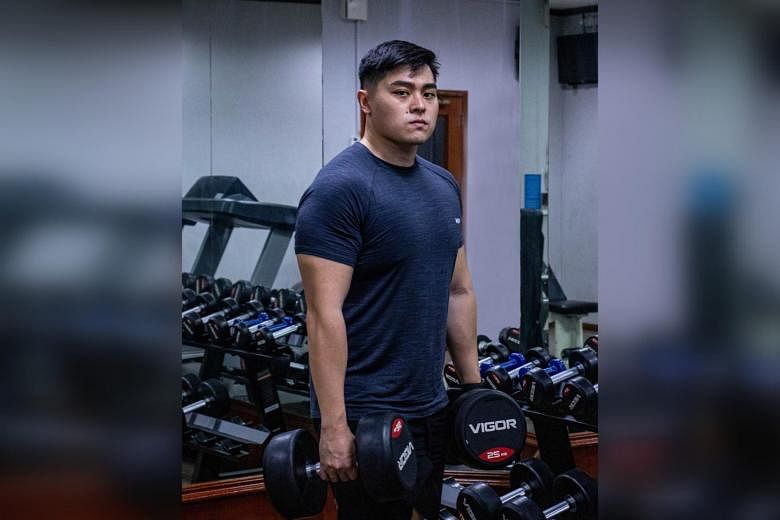Weight gain, exercise and fitness amid Covid-19
Sign up now: Get ST's newsletters delivered to your inbox

Vincent Choo lost a total of 10.5kg as he began exercises such as running and strength-training using the battle rope.
ST PHOTO: DESMOND FOO
SINGAPORE - A recent study revealed that nearly one in three Singaporeans has contracted not Covid-19, but Covid-5 - five extra kilos during the pandemic.
Some, however, managed to keep the extra weight off by maintaining a healthy exercise regime.
When circuit breaker measures shut down gyms last April, full-time national serviceman Clement Lee found himself stuck in a rut.
For about a month, his daily routine consisted of video games, sleep, drinking alcohol, and plenty of snacking.
As a result, he put on three to four kilos, tipping the scales at 98kg.
Clement is 180cm tall.
To recapture some sense of normalcy, he began taking long walks at a nearby park, up to 10km at a time.
"I would pick a movie on Netflix I wanted to watch and just keep walking until the movie ended.
"It didn't matter if I didn't sweat; it felt good that I was doing something," said the 22-year-old.
He gradually began integrating more exercises into his routine, and once gyms were allowed to reopen, he reverted to form.
" I started shedding kilos and gaining back some muscle mass, so I felt a lot stronger and better about myself," he said.
In the aforementioned study conducted by marketing research firm Ipsos, 30 per cent out of 500 Singaporeans aged 21 to 74 revealed they had gained an average of 4.8kg during the pandemic.
Fitness experts say it is important to keep moving by choosing an activity one enjoys.
Professor Michael Chia, an expert on physical education and paediatric exercise physiology at the National Institute of Education, said that people should get up and move around for five to 10 minutes every hour or so, to avoid being sedentary for long stretches of time.
Studies have also shown that one's health also benefits from short bouts of exercise throughout the day, such as squats, stretches, and short dance routines.
Dr Shauna Sim, registrar at the Sports and Exercise Medicine Centre, Khoo Teck Puat Hospital, said that these short spells of exercise are a good way to get active.
"It may be hard for us to set aside 30 minutes at one go for exercise, but finding multiple five to 10 minute-intervals throughout the day for short sessions of physical activity would be more achievable," she said.
But to improve overall fitness and physical health, regular exercise over time is key.
Ms Melanie Anthonysamy, who leads the nutritional team at digital health platform HealthifyMe, recommends regular exercise at least three to four times a week.
She said cardiovascular and strength exercises increase muscle mass, boost metabolism and burn calories, leading to better overall health.
But to prevent injuries, she suggested low-impact exercises, such as walking, dancing, yoga and aerobics, for those less fit or active.
After a level of fitness is achieved, people can move on to high-intensity interval training or HIIT, which has been shown to be beneficial to one's cardiovascular health in the long term, she added.
It is important that people pick an exercise they enjoy, so they can commit to it and exercise consistently over time.
Dr Sim added that the exercise routine should also be convenient, with the necessary equipment or venues being easily accessible.
Getting friends and family on board could also be a great way to keep motivated and make exercise enjoyable, she said.

Meanwhile, some Singaporeans used the down time during the pandemic to get back in shape.
The Ipsos survey found that almost one in four Singaporeans actually lost weight during the pandemic, and around 40 per cent of those surveyed had exercised more.
The Covid-19 outbreak reminded Mr Vincent Choo of the importance of staying fit, and he decided to get back in shape.
"I used to be very active in the past, but when my mum fell ill in 2006, I gradually stopped exercising as I started spending more time taking care of her," said the 45-year-old, who is a trainer for people with special needs.
"But I soon realised that I must take care of myself first before I can start taking care of other people."
He started waking up earlier for short morning runs in May and June last year, losing 2kg in the process.
He then decided to cut out fried and sugary foods, and tried out new exercises for weight loss.
"That's when I discovered the battle rope - a form of weight-training and cardio at the same time," said Mr Choo.
He now exercises five to six times a week, for 45 to 90 minutes at a time. He has dropped an additional 8.5kg.
"Exercising has helped me de-stress and taught me the importance of discipline. Keeping healthy is indeed a long-term investment," he said.

Feelings of sluggishness and restlessness amid the circuit breaker compelled others to turn to exercise.
Feeling the need to stay "energetic and productive", Ms Thu Hoang started working out daily with her best friend, doing cardio and HIIT exercises for around two hours.
"I felt a lot healthier and stronger, and I did not need to snack out of boredom," said the 25-year-old marketer.
"Exercising with a friend is also more fun, so I hope to keep this up and make it a habit."
Additional reporting by Ang Qing


